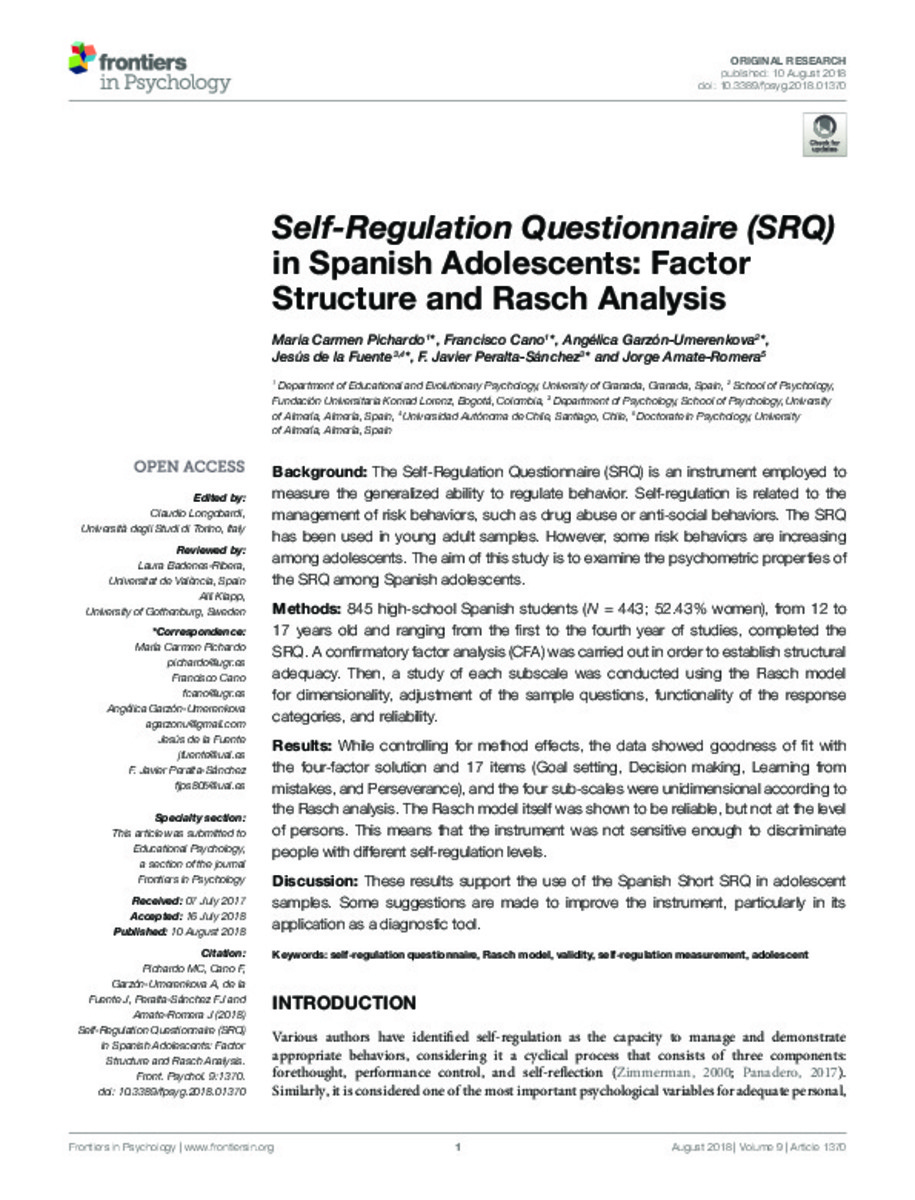Full metadata record
| DC Field | Value | Language |
|---|---|---|
| dc.creator | Pichardo, M.C. (María del Carmen) | - |
| dc.creator | Cano, F. (Francisco) | - |
| dc.creator | Garzón-Umerenkova, A. (Angélica) | - |
| dc.creator | Fuente-Arias, J. (Jesús) de la | - |
| dc.creator | Peralta-Sánchez, F.J. (Francisco Javier) | - |
| dc.creator | Amate-Romera, J. (Jorge) | - |
| dc.date.accessioned | 2018-10-04T11:18:52Z | - |
| dc.date.available | 2018-10-04T11:18:52Z | - |
| dc.date.issued | 2018 | - |
| dc.identifier.citation | Pichardo, M. (Maria del Carmen); Cano, F. (Francisco); Garzón-Umerenkova, A. (Angélica); et al. "Self-Regulation Questionnaire (SRQ) in Spanish Adolescents: Factor Structure and Rasch Analysis". Frontiers in pschology. 9 (1370), 2018, 1 - 14 | es |
| dc.identifier.issn | 1664-1078 | - |
| dc.identifier.uri | https://hdl.handle.net/10171/54293 | - |
| dc.description.abstract | Background: The Self-Regulation Questionnaire (SRQ) is an instrument employed to measure the generalized ability to regulate behavior. Self-regulation is related to the management of risk behaviors, such as drug abuse or anti-social behaviors. The SRQ has been used in young adult samples. However, some risk behaviors are increasing among adolescents. The aim of this study is to examine the psychometric properties of the SRQ among Spanish adolescents. Methods: 845 high-school Spanish students (N = 443; 52.43% women), from 12 to 17 years old and ranging from the first to the fourth year of studies, completed the SRQ. A confirmatory factor analysis (CFA) was carried out in order to establish structural adequacy. Then, a study of each subscale was conducted using the Rasch model for dimensionality, adjustment of the sample questions, functionality of the response categories, and reliability. Results: While controlling for method effects, the data showed goodness of fit with the four-factor solution and 17 items (Goal setting, Decision making, Learning from mistakes, and Perseverance), and the four sub-scales were unidimensional according to the Rasch analysis. The Rasch model itself was shown to be reliable, but not at the level of persons. This means that the instrument was not sensitive enough to discriminate people with different self-regulation levels. Discussion: These results support the use of the Spanish Short SRQ in adolescent samples. Some suggestions are made to improve the instrument, particularly in its application as a diagnostic tool. | - |
| dc.language.iso | en | - |
| dc.rights | info:eu-repo/semantics/openAccess | - |
| dc.subject | Psicología | - |
| dc.subject | Self-regulation questionnaire | - |
| dc.subject | Rasch model | - |
| dc.subject | Validity | - |
| dc.subject | Self-regulation measurement | - |
| dc.subject | Adolescent | - |
| dc.title | Self-Regulation Questionnaire (SRQ) in Spanish Adolescents: Factor Structure and Rasch Analysis | - |
| dc.type | info:eu-repo/semantics/article | - |
| dc.description.note | This is an open access article distributed under the Creative Commons: Atribution License (cc BY) | - |
| dc.identifier.doi | 10.3389/fpsyg.2018.01370 | - |
Files in This Item:
Statistics and impact
Items in Dadun are protected by copyright, with all rights reserved, unless otherwise indicated.






